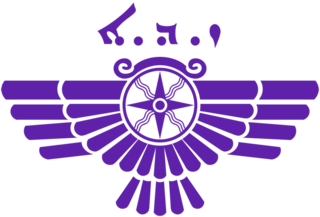
The Assyrian Democratic Movement, popularly known as Zowaa, is an Assyrian political party situated in Iraq, and one of the main Assyrian parties within the Iraqi parliament. The Assyrian Democratic Movement states its aims are to establish equal citizenship rights with the rest of the Iraqi people without discrimination on the basis of nationality, belief, religious affiliation, culture, language and other characteristics of the native Chaldo-Assyrian Syriac people of Iraq, to acknowledge the past massacres committed against them and to ensure they are never repeated again.
Beth Nahrain ; "between (two) rivers") is the name for the region known as Mesopotamia in the Syriac language. Geographically, it refers to the areas between and surrounding the Euphrates and Tigris rivers. The Aramaic name also refers to the area around the rivers, not only literally between the rivers. The area is considered by Assyrians as their homeland.
Dehi is a village in Dohuk Governorate in Kurdistan Region, Iraq. It is located in the Sapna valley in the district of Amadiya.

Badarash is a village in Dohuk Governorate in Kurdistan Region, Iraq. It is located in the Sapna valley in the district of Amadiya.
Hezany is a village in Dohuk Governorate in Kurdistan Region, Iraq. It is located in the Nahla valley in the Amadiya District.
Avzrog is a village in Dohuk Governorate in Kurdistan Region, Iraq. It is located in the district of Simele.

Freydun Bet-Abram, better known as Freydun Atturaya, was an Assyrian national leader, politician, doctor and poet. Atturaya was one of the founders of the first Assyrian political party, the Assyrian Socialist Party, and a prominent early advocate for Assyrian independence. He is remembered by Assyrians today as a romantic figure, considered by some to be a national hero and martyr.
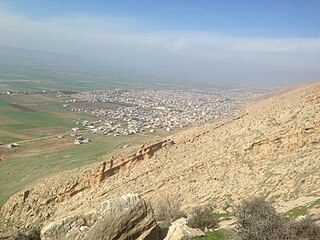
Harir is a town and sub-district in Erbil Governorate in Kurdistan Region, Iraq. The town is located in the Shaqlawa District.
Darbandokeh is a village in Erbil Governorate in Kurdistan Region, Iraq. It is located in the Shaqlawa District.

Terms for Syriac Christians are endonymic (native) and exonymic (foreign) terms, that are used as designations for Syriac Christians, as adherents of Syriac Christianity. In its widest scope, Syriac Christianity encompass all Christian denominations that follow East Syriac Rite or West Syriac Rite, and thus use Classical Syriac as their main liturgical language. Traditional divisions among Syriac Christians along denominational lines are reflected in the use of various theological and ecclesiological designations, both historical and modern. Specific terms such as: Jacobites, Saint Thomas Syrian Christians, Maronites, Melkites, Nasranis, and Nestorians have been used in reference to distinctive groups and branches of Eastern Christianity, including those of Syriac liturgical and linguistic traditions. Some of those terms are polysemic, and their uses have been a subject of terminological disputes between different communities, and also among scholars.

Tyari is an Assyrian tribe and a historical district within Hakkari, Turkey. The area was traditionally divided into Upper and Lower Tyari –each consisting of several Assyrian villages. Both Upper and Lower Tyari are located on the western bank of the Zab river. Today, the district mostly sits in around the town of Çukurca. Historically, the largest village of the region was known as Ashitha. According to Hannibal Travis the Tyari Assyrians were known for their skills in weaving and knitting.

Sharanish is an Assyrian village in Dohuk Governorate in Kurdistan Region, Iraq. It is located near the Iraq–Turkey border in the district of Zakho.
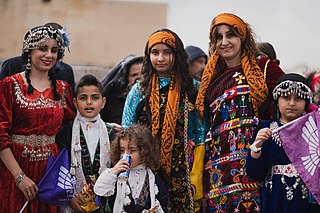
Assyrian continuity is the study of continuity between the modern Assyrian people, an indigenous ethnic minority in the Middle East, and the people of ancient Assyria and Mesopotamia in general. Assyrian continuity is a key part of the identity of the modern Assyrian people. No archaeological, genetic, linguistic or written historical evidence exists of the original Assyrian and Mesopotamian population being exterminated, removed or replaced in the aftermath of the fall of the Assyrian Empire, modern contemporary scholarship almost unilaterally supports Assyrian continuity, recognizing the modern Assyrians as descendants of the East Assyrian-speaking populations of the Neo-Assyrian Empire and Mesopotamia in general, which were composed of both the old native Assyrian population and of settlers in the Assyrian heartland.
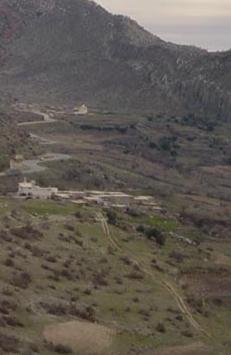
Armash is a village in Shekhan District, Nineveh Governorate of Iraq that falls on the main road that connects the cities of Duhok and Erbil. It is populated by Assyrians, who are mainly followers of the Chaldean Catholic Church.
Dere is a village in Duhok Governorate in Kurdistan Region, Iraq. It is located in the Sapna valley in Amedi District. Dere is the sister village of Komane.
Kani Balavi is a village in Duhok Governorate in Kurdistan Region, Iraq. It is located in the district of Amadiya and the historical region of Barwari Bala.
Bakhetme is a village in the Dohuk Governorate in the Kurdistan Region, Iraq. It is located in the Simele District.

Deraluk is a town and subdistrict in Dohuk Governorate in Kurdistan Region, Iraq. It is located on the Great Zab and in the district of Amadiya.
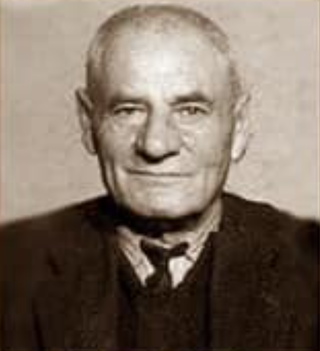
Benjamin Arsanis was an Assyrian politician, writer, teacher and historian. Arsanis was, together with Freydun Atturaya and Baba Parhad, one of the co-founders of the first Assyrian political party, the Assyrian Socialist Party, and he served as the head of the party's central committee. Arsanis was also a prominent member, and in cases founder, of other Assyrian organizations, such as the Society of Assyrian Literary Culture which in the 1910s sought to increase enthusiasm for the Assyrian language and culture. Remembered by modern Assyrians as a respected patriot, writer and orator, Arsanis published several important works on language and history.










